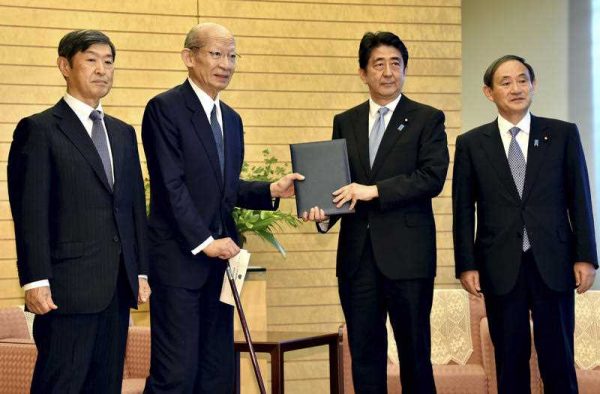It is ironic that the most sincere statement made by any Japanese prime minister, former prime minister Tomiichi Murayama’s statement on 15 August 1995, opened a pandora’s box of historical demons. The most important paragraph of the Murayama Statement is:
‘During a certain period in the not too distant past, Japan, following a mistaken national policy, advanced along the road to war, only to ensnare the Japanese people in a fateful crisis, and through its colonial rule and aggression, caused tremendous damage and suffering to the people of many countries, particularly to those of Asian nations. In the hope that no such mistake be made in the future, I regard, in a spirit of humility, these irrefutable facts of history, and express here once again my feeling of deep remorse and state my heartfelt apology.’
At first, this statement as a whole was not warmly received by China or South Korea. But the two governments responded positively to several key words in the Murayama statement, such as ‘deep remorse’ and ‘heartfelt apology’, as well as ‘colonial rule and aggression’. These words had never before been officially stated by a Japanese prime minister.
In response to the sincerity of the Murayama Statement apology, Chinese and South Korean political leaders issued a joint declaration with their Japanese counterparts in 1998. In the 8 October 1998 Japan–ROK Joint Declaration, South Korean president Kim Dae Jung stated that he ‘highly appreciated the role that Japan has played for the peace and prosperity of the international community through it security policies, foremost its exclusively defence-oriented policy and three non-nuclear principles under the post-war Japanese Peace Constitution’. President Kim also ‘accepted with sincerity this statement of Prime Minister Obuchi’s recognition of history and expressed his appreciation for it’.
This friendly mood did not last more than a decade. The South Korean and Chinese governments suffered domestic attacks for their ‘soft attitude’ towards Japan. In Japan, extreme right-wing groups and intellectuals argued that the government had become too apologetic, and distorted some historical ‘facts’.
So, what can we expect from Abe’s statement on 14 August 2015?
Abe has been trying to balance two political imperatives. On the one hand, Prime Minister Abe wants to make his historical statement more forward-looking. On the other hand, he needs to foster friendlier relations with China and South Korea based on an understanding of history that would be acceptable to the peoples of the two countries.
To meet these difficult aims, he established the ‘Advisory Panel on the History of the 20th Century and on Japan’s Role and World Order in the 21st Century’ on 25 February 2015. After intensive discussion the Panel published a final report on 6 August. A majority of the members of the advisory panel recognise the importance of maintaining the essence of the previous prime ministerial statements, including the Murayama statement. At the same time, they also argued that a new statement should be more forward-looking and focus on Japan’s post-war historical path as a peace-loving country.
In the final report of the advisory panel, the essence of the Murayama statement is firmly supported:
‘Thus, after the Manchurian Incident, Japan expanded its aggression against the continent, deviated from the post-World War I shift towards self-determination, outlawry of war, democratisation, and an emphasis on economic development, lost sight of the global trends, and caused much harm to various countries, largely in Asia, through a reckless war. In China in particular, this created many victims across wide areas. …. In the colonies, Japan acted counter to the tide of self-determination. Colonial rule became particularly harsh from the second half of the 1930s on.’
Major newspapers in Japan have approved of the wording of this report, and recommended the government fully respect its basic arguments. By using key words, such as ‘aggression’, ‘colonial rule’ and ‘deep remorse’, this report obviously inherits the essence of the Murayama statement. The only key word that does not appear in the final report of the advisory panel is ‘apology’.
But it should be noted that underscoring Japan’s post-war path as a peace-loving nation seems to be the more important element of this report. The report states that one of the most important ‘lessons to be learned from the 20th century’ is that ‘based on deep remorse over the war, Japan has been reborn as a country that is completely different from what it was in the first half of the 20th century’. And ‘peace, rule of law, liberal democracy, respect for human rights, the free trade system, self-determination, support for the economic development of developing countries are what characterise post-war Japan’.
These arguments embody the views of the majority of Japanese people today and are openly supported by many intellectuals. As long as the governments and prime ministers of Japan are also seen to agree with these sentiments, Japan’s historical issues with its neighbours may be a little easier to deal with.
Yuichi Hosoya is Professor of international politics at Keio University, Tokyo.

